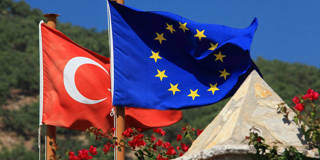When suicide bombers struck at a peace rally in Ankara, the Turkish government responded with a broadcast ban and a clampdown on social media. As the country heads to a general election in November, the EU must not remain silent about the government’s crackdown on freedom of expression and other civil liberties.
BRUSSELS – When suicide bombers killed at least 97 people at a rally of pro-Kurdish activists and civic groups advocating peace between the Turkish government and the militant Kurdistan Workers’ Party (PKK) in Ankara on October 10, the government’s response was as rapid as it was troubling. Turkish Prime Minister Ahmet Davutoğlu swiftly imposed a temporary broadcast ban on images of the terror attack, and many in the country reported that Twitter had been blocked on some of the most widely used mobile networks, including Turkcell and TTNET.

BRUSSELS – When suicide bombers killed at least 97 people at a rally of pro-Kurdish activists and civic groups advocating peace between the Turkish government and the militant Kurdistan Workers’ Party (PKK) in Ankara on October 10, the government’s response was as rapid as it was troubling. Turkish Prime Minister Ahmet Davutoğlu swiftly imposed a temporary broadcast ban on images of the terror attack, and many in the country reported that Twitter had been blocked on some of the most widely used mobile networks, including Turkcell and TTNET.